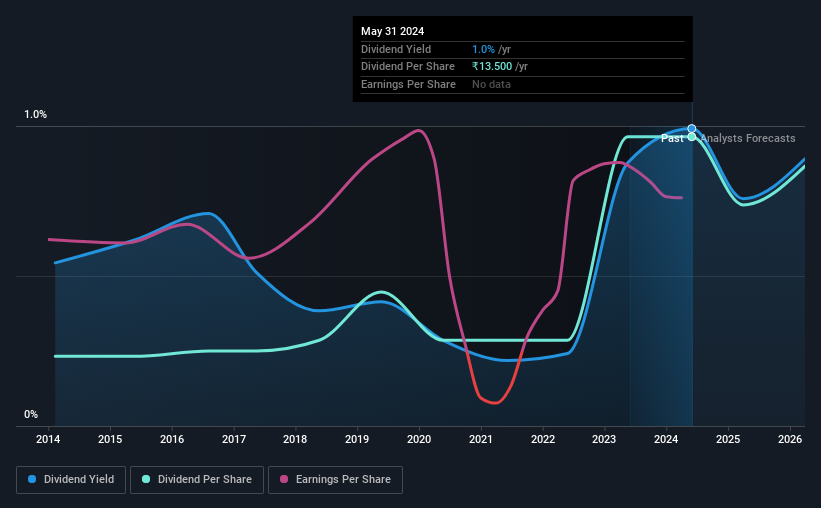Bata India (NSE:BATAINDIA) Is Reducing Its Dividend To ₹12.00

The board of Bata India Limited (NSE:BATAINDIA) has announced that the dividend on 6th of September will be reduced by 11% from last year's ₹13.50 to ₹12.00. This means the annual payment is 1.0% of the current stock price, which is above the average for the industry.
Check out our latest analysis for Bata India
Bata India's Dividend Is Well Covered By Earnings
Impressive dividend yields are good, but this doesn't matter much if the payments can't be sustained. Prior to this announcement, Bata India's dividend was comfortably covered by both cash flow and earnings. This means that a large portion of its earnings are being retained to grow the business.
The next year is set to see EPS grow by 100.8%. If the dividend continues along recent trends, we estimate the payout ratio will be 26%, which is in the range that makes us comfortable with the sustainability of the dividend.

Dividend Volatility
While the company has been paying a dividend for a long time, it has cut the dividend at least once in the last 10 years. Since 2014, the annual payment back then was ₹3.25, compared to the most recent full-year payment of ₹13.50. This works out to be a compound annual growth rate (CAGR) of approximately 15% a year over that time. Despite the rapid growth in the dividend over the past number of years, we have seen the payments go down the past as well, so that makes us cautious.
Bata India May Find It Hard To Grow The Dividend
With a relatively unstable dividend, it's even more important to evaluate if earnings per share is growing, which could point to a growing dividend in the future. Over the past five years, it looks as though Bata India's EPS has declined at around 4.4% a year. Declining earnings will inevitably lead to the company paying a lower dividend in line with lower profits. However, the next year is actually looking up, with earnings set to rise. We would just wait until it becomes a pattern before getting too excited.
In Summary
In summary, dividends being cut isn't ideal, however it can bring the payment into a more sustainable range. In the past, the payments have been unstable, but over the short term the dividend could be reliable, with the company generating enough cash to cover it. Overall, we don't think this company has the makings of a good income stock.
Companies possessing a stable dividend policy will likely enjoy greater investor interest than those suffering from a more inconsistent approach. Meanwhile, despite the importance of dividend payments, they are not the only factors our readers should know when assessing a company. For example, we've picked out 1 warning sign for Bata India that investors should know about before committing capital to this stock. Looking for more high-yielding dividend ideas? Try our collection of strong dividend payers.
Valuation is complex, but we're here to simplify it.
Discover if Bata India might be undervalued or overvalued with our detailed analysis, featuring fair value estimates, potential risks, dividends, insider trades, and its financial condition.
Access Free AnalysisHave feedback on this article? Concerned about the content? Get in touch with us directly. Alternatively, email editorial-team (at) simplywallst.com.
This article by Simply Wall St is general in nature. We provide commentary based on historical data and analyst forecasts only using an unbiased methodology and our articles are not intended to be financial advice. It does not constitute a recommendation to buy or sell any stock, and does not take account of your objectives, or your financial situation. We aim to bring you long-term focused analysis driven by fundamental data. Note that our analysis may not factor in the latest price-sensitive company announcements or qualitative material. Simply Wall St has no position in any stocks mentioned.
About NSEI:BATAINDIA
Bata India
Manufactures and trades in footwear and accessories through its retail and wholesale network in India and internationally.
Solid track record established dividend payer.
Similar Companies
Market Insights
Community Narratives



